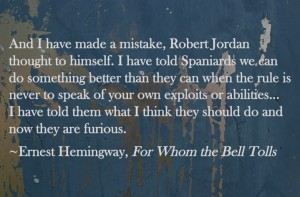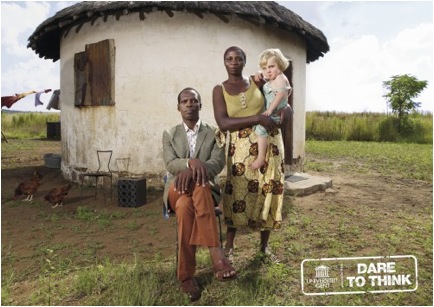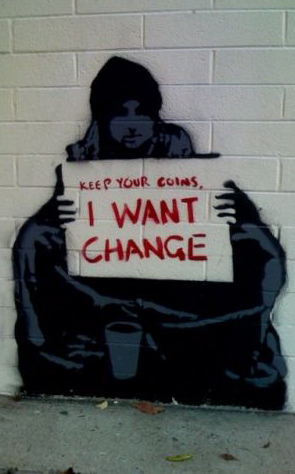“For all of us who are in the ‘change the world’ business, we seldom reflect on our own attitudes and behaviours as donors, facilitators, managers, experts, technocrats. Yet we want to see change in the attitudes and behaviours of those we serve?! We do not want to change the power status quo within organisations and amongst ourselves, yet we are telling ‘communities’ to do so?!” ~from a how-matters.org reader
Much of the talk about poverty reduction and international development rests firmly within the cerebral aspects of our work – complex issues or interdependent sectors such as jobs or health, target groups such as girls, policy changes, or the paradigm of foreign aid itself.
 Yet as people working for change, we rarely have an opportunity to reflect on how our own personal approach affects the relationships and processes of which we are a part. People need more structured, honest, and in-depth conversations to explore how to work within power asymmetries and challenge the “infusion of outside expertise” mentality, getting community leaders the resources they need to address their own priorities.
Yet as people working for change, we rarely have an opportunity to reflect on how our own personal approach affects the relationships and processes of which we are a part. People need more structured, honest, and in-depth conversations to explore how to work within power asymmetries and challenge the “infusion of outside expertise” mentality, getting community leaders the resources they need to address their own priorities.
This is why I have been busy working on a “How Matters Hub” concept, a way for people to include and initiate dialogue on these important, though often overlooked, issues.
Dr. Shawn Humphrey, founder of the Two Dollar Challenge, has offered me a chance to pilot the first “How Matters Hub” at the 2012 Poverty Action Conference, hosted by the University of Mary Washington in two weeks.
So far, the How Matters Hub guidelines are built around 27 (and counting!) topics, each presented in separate sections. Each topic is guided by an overarching question related to international assistance. (And yes, some are asked tongue in cheek, so don’t jump all over them.) The guidelines are created to be general enough so that they can be applied to a variety of specific issues or themes i.e. the organizers of a conference or meeting could use them if the gathering were about education, just as if it were about malaria.
 Each section is a collection of conversation starters and stimulators—discussion questions, short articles/stories, video/audio clips, and images. The sections conclude with suggested readings for facilitators and/or participants to learn more about others’ perspectives on the topic. I’ve already included some articles from whydev.org, A View from the Cave, Good Intentions Are Not Enough, iOnPoverty, Journeys towards Justice, Waylaid Dialectic, Tales from the Hood, Staying for Tea, Lessons I Learned, Water Wellness among others, but more are needed!
Each section is a collection of conversation starters and stimulators—discussion questions, short articles/stories, video/audio clips, and images. The sections conclude with suggested readings for facilitators and/or participants to learn more about others’ perspectives on the topic. I’ve already included some articles from whydev.org, A View from the Cave, Good Intentions Are Not Enough, iOnPoverty, Journeys towards Justice, Waylaid Dialectic, Tales from the Hood, Staying for Tea, Lessons I Learned, Water Wellness among others, but more are needed!
And here’s where I need your help, readers and fellow bloggers! I’m asking you to share the articles/blog posts, media, and books you’ve read or written that you would help people answer each of the questions below! Please leave them in the comments section.
Let’s help our colleagues and the next generation of do-gooders learn how to do this work better and quicker than we did.
It’s time to make new mistakes, not old ones.
***
“How Matters Hub” Guiding Questions
- What is a good life?
- How do I teach people to fish?
- How can I explain difficult concepts to “uneducated” people?
- How can I serve as a “voice for the voiceless”?
- How do I build rapport with people who are vastly different from me?
- Is throwing back “just one starfish” enough?
 How can I sell the difference between “charity” and “empowerment”?
How can I sell the difference between “charity” and “empowerment”?- How long does it take to “make a difference”?
- Isn’t it good enough as long as I’m doing something to “make a difference”?
- What’s the difference between doing “for” or doing “with” the people I want to help?
- How do I know if there are people already working on the issues/areas in which I’m interested?
- How do I learn how people approach their own problems?
- How can I focus on what resources people do have, rather than what they don’t have?
- How do I help unleash community action and get behind people’s existing efforts to help themselves?
- What do I do when things aren’t going my way? (which they sometimes won’t)
- How do I get feedback from the people I want to help?
- What does it mean to “walk boldly” and “fail proudly”?
- With so much information at our fingertips, how do I stay open to what I don’t or can’t know?
- Do I romanticize poverty?
- How do I identify and challenge my own assumptions about people in need?
- How can I best portray Africa when people have so many pre-conceived notions? (HINT: It’s not a country.)
- How do I tell a compelling story about people in need that doesn’t simplify or stereotype?
- What constitutes “expertise”? Who has it?
- What knowledge or skills do I need to be successful in international assistance work?
- How do I know if I should start my own organization?
- How do I find a mentor?
- How can I determine if I should become an expat “aid worker”?
***
Acknowledgements
Initial ideas and inspiration for the “How Matters Hub” came from a meet-up that occurred in Washington D.C. in August 2012. I’m very grateful to Oscar Abello, Marc Maxson, Julienne Lauler, Fabrice Musoni, Alison Carlman, Maria Anderson, Peck-Gee Chua, Debbi Winsten, and Christina Perkins for their willingness and enthusiasm to help shape these guidelines.
***
Related Posts
Same aid language, different dialects?
Want to make aid better? Let us play!
Bottlenecks and Dripfeeds: How much has changed?

Love your blog. Here’s a blog post of mine regarding perceptions… (your number 20):
http://www.trayle.org/2010/09/indicators.html
and some others along the same theme, but more subtle maybe…
http://www.trayle.org/search/label/Heisenberg
(and there’s even a poem or two.) 🙂
Ok…i’m not precisely sure this answers numbers 5 and 20 but it kinda does from MY perspective cept I wrote it in this airy fairy way and i wrote it as someone who was both local and expat…. it’s for sure, food for thought. and it’s in two languages…sorry about that! http://zehrarizvi.blogspot.com/2010/11/pakistan-postone-of-probably.html
For #9, this blog post from Open the Echo Chamber seems to the point: http://www.edwardrcarr.com/opentheechochamber/2011/10/06/at-what-scale-can-we-fail/
Also, I guess my book Delivering Development is an extended argument that not knowing what we are talking about makes us pretty dangerous.
To that end, I guess Delivering Development does lay out a bit of #12. I have an article that was just accepted (I have to finalize revisions this week) that addresses this in a systematic way that I can pass along, as well.
I love this idea! Jennifer, I know you’ve already got a lot of question hubs, but I wonder if if might be useful to include something that addresses regional differences (or similarities) in the Global South, including Asia and Latin America in the mix.
From Alanna Shaikh via Twitter: “I am still proud of this blog post and it might be useful for you” http://bloodandmilk.org/2010/03/08/drinking-our-own-ors/
And a comment from Pakistan via LinkedIn: “I agree with the idea but disagree with the word “help”. Youth don’t need “help”, and they have more innovative ideas than all the qualified, experienced experts put together. The question should be: How do we create an enabling social an dintellectual enviornment for the youth to brainstorm, come up with ideas, implemnetation plans etc….? We have nothing to teaching them. They are far too intelligent, perceptive and sensitive for that. We are more or less redundant. Lets just ensure a free environment and let them think for themselves. They dont need tutoring or coaching from spent-forces like us. We are totally irrelevant to post-modern world. Please dont mind it.”
In reference to number 22 (which I believe was one of my “big questions”) – this has been really helpful by in SSIR: http://www.ssireview.org/blog/entry/the_problem_with_problem_statements.
This is an article that we recently dug up from 2010 as we’re thinking through how to better tell the stories behind complex problems. The author argues,”forgoing the articulation of a problem statement and focusing on paradox leads to more effective communication with your organization’s supporters.”
Pingback: What to Do When Things Go Wrong « Earth in Here
Hey – sounds good.
On:
What is a good life?
Richard Layard’s book ‘Happiness’ and Amartya Sen’s ‘Development as Freedom’ are good.
On 12 maybe one of the Robert Chambers books?
On 13 Appreciative Inquiry sounds like the area you’re looking for, although I can’t think of any specific suggestions.
On 21 and 22 – Maybe the Oxfam funded research report Finding Frames might be good. (I haven’t read it but my wife reckons it’s excellent).
http://findingframes.org/Finding%20Frames%20New%20ways%20to%20engage%20the%20UK%20public%20in%20global%20poverty%20Bond%202011.pdf
Pingback: Good questions | A Conspiring Universe